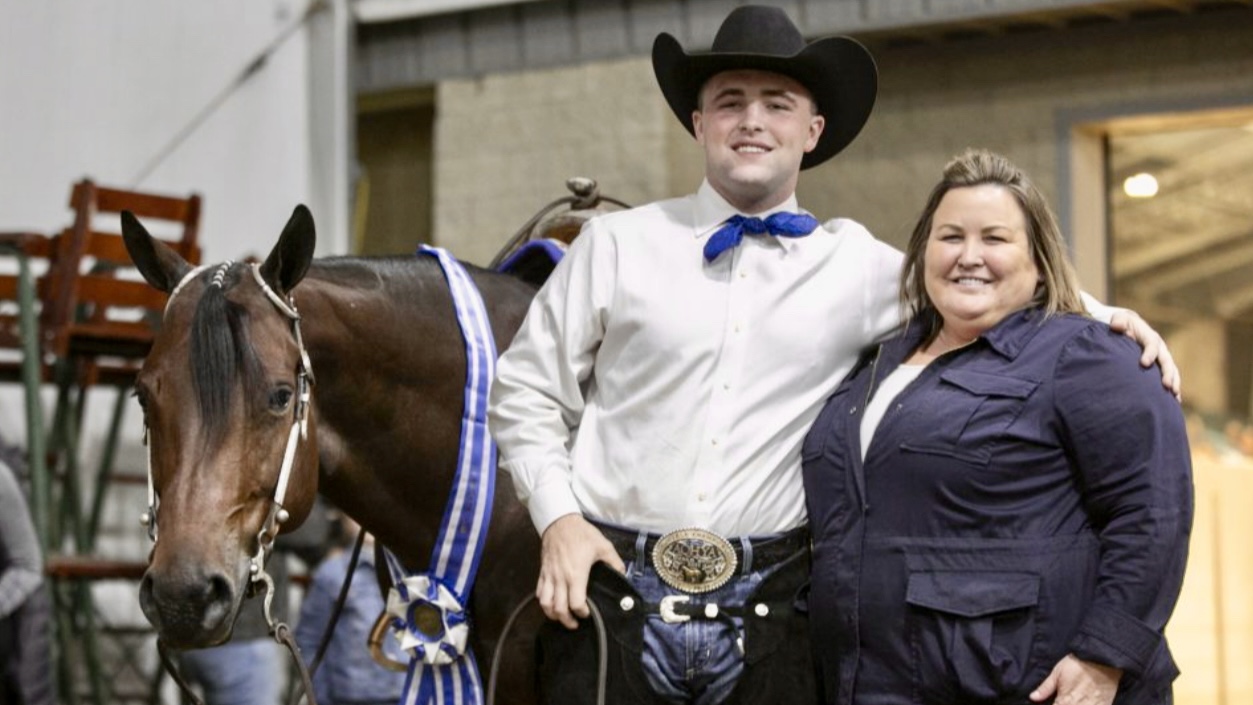Involving children in horseback riding has been proven to provide them with benefits that last a lifetime, from encouraging responsibility, to participation in a community, to commitment, to perseverance and resilience, to teaching sportsmanship and beyond.
However, the full reward of these benefits cannot be known if your child decides to no longer participate.
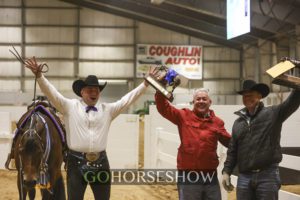 Unfortunately, one of the most cited reasons for a child wanting to leave the horse industry is that it is no longer “fun.”
Unfortunately, one of the most cited reasons for a child wanting to leave the horse industry is that it is no longer “fun.”
One of the biggest contributors to whether the experience is “fun” is the child’s own parents.
We spoke with Melissa Armstrong, mother of AQHA Congress and Youth World Champion Grant Mastin, to get some tips for how to keep horse showing fun for our kids.
Don’t Count Money, Count Experiences
We hear it all the time throughout our industry, “Horses ain’t cheap.” And while this is true, it can become a major sticking point for issues between parents and their children.
Often, there is a temptation when the expense is high to want to see a direct outcome to justify the expense. The problem is in what we use to justify what makes horses “worth it.”
If the acceptable reward for parental investment is a title or win, then it is rare for your child to give you the return you’re looking for, and it is even more rare that it happens consistently.
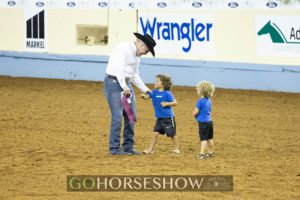 “You aren’t paying for a title,” Armstrong reminds, “You are paying for an experience for your child. Hopefully, with enough effort and time, they will get a big win – it really is an amazing moment for them. But, I want the win to validate my child’s investment and not my own. I try to frame the return on my financial investment by reminding myself that my teenage son loved hanging out with me and his horse on the weekends, instead of getting in trouble – and that is well worth the money.”
“You aren’t paying for a title,” Armstrong reminds, “You are paying for an experience for your child. Hopefully, with enough effort and time, they will get a big win – it really is an amazing moment for them. But, I want the win to validate my child’s investment and not my own. I try to frame the return on my financial investment by reminding myself that my teenage son loved hanging out with me and his horse on the weekends, instead of getting in trouble – and that is well worth the money.”
Armstrong says that building an experience is a great way to horse show. While you may need to “play the parent” and tell them they need to get sleep before a big class, there are times where it is just as important to encourage your kid to go hang out with their horse show friends and go to dinner and movies and enjoy being a kid with others who share their passion.
Variety is the Spice of Life
Recently in the sporting world, there has been a push to get children to specialize at a young age in order to allow them to become more competitive in their specific sport/discipline.
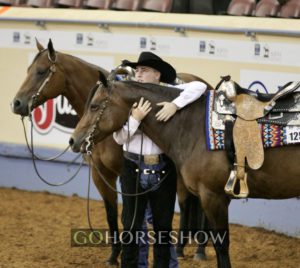 However, only involving your child in horses can create burnout, especially if they aren’t winning regularly.
However, only involving your child in horses can create burnout, especially if they aren’t winning regularly.
“I don’t think horses should be everything,” Armstrong chuckles. “I think you need other activities to help you excel in the horse world. If you don’t know how to be a team player, then it will be hard to make genuine friends at shows. You need to know how to support other people. And I think kids need to be well-rounded.”
Armstrong’s son Grant also plays football. She admits, encouraging him to be involved in multiple extra-curricular activities, “does make things hectic and it can be hard to do with the horse show schedule, but it is important to balance other activities with the horses. This doesn’t mean horses can’t be the primary activity, but having some supplemental activities is nice to give you and your kid a mental break.”
Additionally, if your child is complaining of being bored, one way to encourage them is to allow them to try new things and events. “I also think it’s helpful to dabble in multiple events.” Armstrong believes trying different events or disciplines is a great way to find your child’s passion and also to discover which events are best suited for your child and their horse.
Include Your Child In Decision-Making
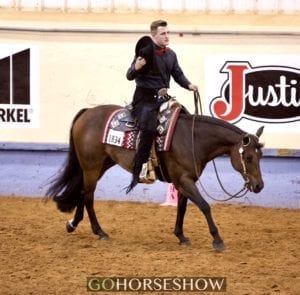 Often times, we can discount our children’s abilities to make decisions for themselves, especially when they are young. However, including them in the decision-making process, like which shows to go to, what classes to show in, and what outfit to wear, encourages their participation in that activity.
Often times, we can discount our children’s abilities to make decisions for themselves, especially when they are young. However, including them in the decision-making process, like which shows to go to, what classes to show in, and what outfit to wear, encourages their participation in that activity.
“It’s important to involve kids with decision-making at all stages. Obviously, as they get older, they can be involved in bigger, more complex decisions. But, keeping them involved behind the scenes helps them avoid feeling like they are only showing for your sake as the parent. It’s good for them to take ownership of their passion. It’s also good for them to learn from bad decisions and make better ones next time.”
Avoid Being Critical of Their Efforts
Parents want what is best for their kids, and sometimes this pure intention results in parents becoming critical when they see their kids not performing at their best or giving their best efforts.
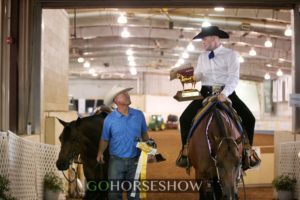 However, Armstrong believes that the major criticisms should be the responsibility of the trainer (aka the coach), whereas the parents should play a primarily supportive and encouraging role (aka the cheerleader).
However, Armstrong believes that the major criticisms should be the responsibility of the trainer (aka the coach), whereas the parents should play a primarily supportive and encouraging role (aka the cheerleader).
“I think parents should do their best to stay out of the way,” Armstrong laughs. “This doesn’t mean you can’t be involved or concerned, but you just shouldn’t be the driving force for criticism or pressure in your child’s show life.”
Armstrong recalls, “When Grant was showing in the small fry division at the Congress, a parent asked me if Grant was ready. And I thought to myself, ‘I have no idea, I hadn’t been watching.’ I would often run errands or get things done during lessons and it ended up being a bit of a blessing because I wasn’t in Grant’s way. The key was making sure I got the right people involved to coach him that I could trust to do right by my son and his horse.”
Avoid Telling the Trainer How to Train
This next tip piggybacks on avoiding criticism. Specifically, you pay the trainer to train…let them do their job. While a parent can certainly question training techniques and seek to find the program that is the best fit for their child, it is not the role of the parent to tell the trainer how to do their job.
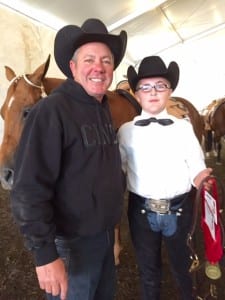 Indeed, children know when there is conflict between their parents and their trainer and it makes shows uncomfortable as opposed to being opportunities to learn.
Indeed, children know when there is conflict between their parents and their trainer and it makes shows uncomfortable as opposed to being opportunities to learn.
“You really need to trust your team,” Armstrong emphasizes. “It’s important to allow trainers to do their job. I don’t want to put a cloud over my trainer’s relationship with my child by being difficult to deal with. If you hire the right team that treats your child and horse with respect, then it is better to be a more silent observer.”
Armstrong recommends that parents be present enough to be fully aware of what is going on, but restrained enough to not feel the need to give your two cents on everything.
She admits, “Sometimes it’s easy to be so invested in your child and the animal that it is hard to keep your mouth shut, but if it reaches a point where you do need to speak up, don’t do it at the show. Address any issues with your trainer privately at home so that you avoid adding extra stress or hard feelings to the show environment.”
Be An Example of Good Sportsmanship
For better or worse, children are sponges that soak in their parents’ behaviors. If you get angry when they lose or spend time criticizing judges and other competitors in front of them, they will either wind up being embarrassed by you, or mimicking your bad behavior.
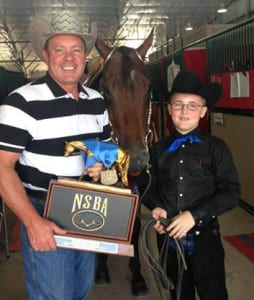 Often, the best mirror of our own behavior is the behavior of our children. Therefore, if you want your child to be a good sport, then you must be a good sport.
Often, the best mirror of our own behavior is the behavior of our children. Therefore, if you want your child to be a good sport, then you must be a good sport.
“It can be hard for me to not get emotionally invested, but we have a saying, ‘Successful people don’t worry about the opinion of others.’ You are who you are regardless of the opinion of a single judge or a bad ride. You are more than your worst days and so it’s important to have a positive attitude.”
“I try to remind Grant someone is always watching you, whether it’s a competitor, or a judge, or a kid that wants to be just like you – so it’s very important to be a good representative of yourself.”
***
In closing, Armstrong reminds us, “You never know when an experience will be your last one – kids grow up so quickly and our time with them is truly short. I think it’s important to keep horse shows fun and something you look forward to and look back on fondly. This sport shouldn’t just be about making great moments for the kids, it should make great memories for the parents too. And the best way to do that is to genuinely have fun together.”


